Sleuthing out the answer to this question sets Veronica and Stoker on their wildest adventure yet. From the underground laboratories of scientists experimenting with electricity to resurrect the dead in the vein of Frankenstein to the traveling show where Stoker once toured as an attraction, the gaslit atmosphere of London in October is the perfect setting for this investigation into the unknown. Through it all, the intrepid pair is always one step behind the latest villain—a man who has killed once and will stop at nothing to recover the body of the woman he loved. Will they unmask him in time to save his next victim? Or will they become the latest figures to be immortalized in his collection of horrors?
Comment: This is the most recent installment in the Veronica Speedwell series by author Deanna Rayburn. I have enjoyed the books a lot and would not miss a new one!
In this new adventure, Veronica and Stoker are busy with their work when their employer lord Rosemorran arrives with a wax figure he asks them to fix with a mechanism, so it could seem alive, a sort of Sleeping Beauty doll for his daughter Rose. The problems begin when they find out the image isn't a wax figure, but a real person who was preserved in artificial conditions. This starts them off in a new investigation and the more clues they follow, the more troublesome facts they uncover. They also find some confusing information is being given to them, but whom should they trust? Veronica and Stoker have a hard work ahead but they will do what is necessary to give peace to the poor woman and finally lay her to rest...
As it happened with the previous installments, so did this one engage me in a perfect way and I was easily immersed in the story and in what the main characters were doing. I think the themes and situations explored were fascinating enough, if not slightly too macabre, but I must say that the way the plot went on to justify the villain's acts and behavior was not as brilliant to me. With this I mean to say that the villain was easy to identify and the psychological factors for why were a bit exaggerated.
That didn't ruin the reading experience, though, and I think the fact Stoker and Veronica seemed quite amorous compensated for the other details I might have liked less. That means this was a story I expected to like and thankfully, it did have plenty of scenes to simply savor the story.It was also interesting to notice that while some things have been established, namely the protagonist' relationship, there is still room to add layers. I wonder where the author wants to go, will their relationship ever change, considering their personalities and Veronica's independence? I would not mind things to go into a more formal scenario between them, but would that change who they are as characters and why fans like the series? Food for thought...
In regards to the plot, tit had its ingenious content, and it's always fascinating to see the result of the author's investigation and research. There is always some interesting theme and facts associated with it, and how secondary characters present themselves in relation to it. This time, the wax figures and the attempts to give life back to the dead were the focus but while creating the plot, a lot more about the late 19th century went into it and it seemed to me that the historical research was used very competently. Well, it always is in these books, but sometimes the juxtaposition of themes/facts isn't as entertaining.
The story of the wax figure was quite tragic when we learn what happened to the woman whose body was preserved that way. It does make one think how embalming is done and what procedures go into it. I confess I'm not a particular fan of this theme but what the author chose to use here was enough to paint a picture and it does make one think about what these so called scientists did and how they experimented on subjects which now we know to be unethical and lacking any kind of method. Despite this, the descriptions give credit to innovation and knowledge of these people, stuck in a time where the obvious lack of mechanisms and machines made everything a gamble or a risk.
I'd say the most interesting element would be the motifs of the villain and how things came to be. I think this was a little disappointing because it feels as if the author wanted to give the impression the villain acted out of obsession, lack of control... which I can accept as likely, but in a way it made things look rather simplistic and without the proper psychological depth that certainly had to be part of any reasoning. Perhaps the author wrote it for the reader to see it implied but if so, it was too subtle and to me, the result was one of making the villain look more mad than logical.











